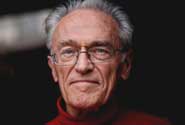The death, at the age of 81, of the social policy researcher and campaigner Peter Townsend closes a career that sometimes seemed as if it would never end. Even after heart problems and contracting pneumonia, Townsend continued to research, teach and campaign, driven always by a sense that the truth had power.
He became a public figure in the 1960s when, together with Brian Abel-Smith, he "rediscovered" British poverty, a problem then often complacently discussed in the past tense, as if it were something the Beveridge Report had solved. Despite its huge significance, however, this work was merely one aspect of a career of many parts, mixing politics and advocacy with an extraordinary range of research. Townsend railed against the narrowness of modern academic life, covering everything from children's rights to nursing homes, at some times soaring to adopt a global perspective, at others diving to analyse, for instance, the social effects of shopping centres in Manchester. But a single thread tied the strands of his work together - concern about inequality.
Townsend grew up living a hand-to-mouth existence with his single mother as she attempted to eke out a living as a singer during the 1930s. That gave him an acute sense of what he called "the rough edges of life", a sense that would eventually inform his research. Before he could pursue that, though, he needed to win, first, a scholarship at University College school, London, and then, with the encouragement of an inspirational teacher, a place at St John's College, Cambridge. There he studied anthropology before taking his studies to the new Free University of Berlin, a city still recovering from the war, where he switched to sociology.
He then spent the 1950s engaged in research in Britain, with posts at the Institute for Community Studies and the London School of Economics, before, in 1963, becoming one of the first professors at the new University of Essex. In the 1980s he moved to Bristol University, where he kept a post right to the end, and, in 1998, he took up a second emeritus chair, at the LSE.
As well as studying ageing, Townsend made it his task to establish the facts about poverty in Britain. He sought to make his case unarguable to the authorities by counting as poor only those families who fell below the "official poverty line", implied by the supposed safety net of means-tested benefit rates.
To ensure his work was authoritative he used Whitehall's own analysis, but there were substantial gaps in the evidence the civil service collated. So he ended up in the bowels of the Ministry of Labour's Colindale office, trawling through hundreds of the raw questionnaires on which official statistics were based. The work has informed almost all academic research on poverty since.
As the damning evidence on hardship was gathered, Townsend sought to move from analysis to deeds, co-founding the Child Poverty Action Group, the campaigning outfit whose presidency he held until the end of his life. His advocacy work did not stop there: he also co-founded the Disability Alliance and worked within the Labour party to do something practical about poverty.
His work on health inequalities, notably through the 1980 Black report, led to a transformation of the academic field. Another overriding concern through the 1970s was to develop a poverty line rooted in such rigorous social science that it would be impossible to dispute, although, by a cruel quirk of fate, the work culminated in 1979, the year Margaret Thatcher was elected. After that, all the implications of his study for policy simply dropped off the political agenda. Townsend was a dogged chronicler of, and campaigner against, the subsequent widening of the income gap. But during the long Conservative years his was a marginal voice.
He had brief hopes when New Labour arrived, and especially after Tony Blair pledged to eliminate child poverty in 1999. In the end, however, he was left bitterly disillusioned, acknowledging that Blair and Gordon Brown were redistributing to the poor, but profoundly offended by the mean-spirited way in which he thought they went about it. He was troubled not only by the endless emphasis on benefit claimants who "played the system", which he felt stigmatised the honest majority, but also by the reliance on tax credits, as opposed to simple entitlements that were paid as of right.
Over the last two decades he began to look at the topics he had been concerned with through the prism of human rights. He saw the development of a global rights culture as the most promising feature of our age, so, despite his disillusion with Britain's politics, this shift lent him a new optimism. This was encouraged by his third wife, the Labour peer Jean Corston, who was a guiding light in parliament's joint committee on human rights.
He described himself as falling "head over heels" in love with her. They married in 1985. She survives him, along with five adult children and two stepchildren, all of whom he was intensely involved with, remarking towards the end of his life that, work aside, his primary interest was family.
- Peter Brereton Townsend, academic, born 6 April 1928; died 7 June 2009
Reproduced courtesy of Guardian News and Media 2009
